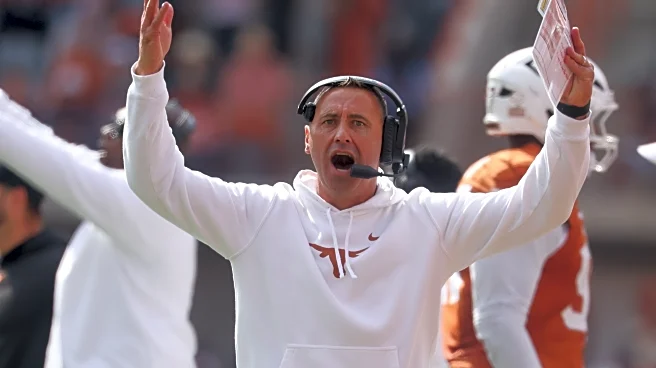College football has an epidemic of poor officiating, with an epicenter in the SEC.
Less than a month after the conference reportedly suspended longtime referee Ken Williamson for controversial, game-changing
calls in the Auburn-Georgia game on Oct. 11 — nine of 11 contested calls submitted to the league office by the Tigers were deemed to have merit — the crew led by Lee Hedrick helped key No. 9 Vanderbilt’s attempted comeback against No. 20 Texas in Austin on Saturday.
It’s the type of incompetency that can put coaches on tilt and trickle down to the entire team.
“I felt like, myself included, we got too caught up in the officiating,” Longhorns head coach Steve Sarkisian admitted after the 34-31 win that included 21 fourth-quarter points by the Commodores.
Texas plans to submit multiple calls to the league office for explanation.
Cutting into a 34-10 margin, Vanderbilt scored its second touchdown of the game early in the fourth quarter on a 25-yard scramble by quarterback Diego Pavia that resulted in a lengthy post-touchdown delay as Hedrick’s crew attempted to sort out a personal foul call on Pavia for throwing the football at Longhorns redshirt freshman safety Xavier Filsaime after the score, resulting in offsetting penalties when Texas junior cornerback Manny Muhammad was flagged for his own personal foul.
Hedrick explained that Muhammad was flagged for “contact above the shoulder” even though a replay showed that Muhammad pushed a Vanderbilt player below the shoulder in retaliation.
Even the scramble by Pavia put into perspective the incompetence of Hedrick and his crew — Longhorns freshman edge Lance Jackson was tackled by the Commodores offensive tackle on the play as Pavia vacated the pocket in the other direction.
Texas redshirt sophomore quarterback Arch Manning converted two third downs through the air as the Longhorns tried to mount a response before facing a 3rd and 6 from the Vanderbilt 33-yard line. With the Commodores bringing a Cover 0 blitz, sophomore wide receiver Emmett Mosley ran a go route against single coverage and Manning delivered a good ball into the end zone that Mosley initially appeared to catch for a critical touchdown to put the game out of reach.
And although the call was correctly overturned because Mosley was not able to control the football, replays revealed that Mosley wasn’t able to secure the catch because of an egregious missed pass interference penalty on the play.
Instead of receiving 10 yards and a new set of downs, the Horns had to attempt a 51-yard field goal missed by redshirt senior kicker Mason Shipley as the no call cost Texas between three and seven points.
Vanderbilt responded with a 67-yard touchdown pass on its next play from scrimmage and benefited from another controversial call on the two-point conversion when Junior Sherrill was tackled at the goal line by Jaylon Guilbeau.
Initially ruled a conversion on the field, the call was upheld even though sideline views clearly showed the ball did not break the plane. At the least, the ball never made contact with the pylon even though the play ended at it, leaving Guilbeau shocked by the decision in a post-game radio interview.
On the ensuing drive by the Longhorns, looking to draw the Commodores offside after lining up to go for a 4th and 6 from the Vanderbilt 31-yard line, Texas appeared to succeed by baiting a defender into the neutral zone, but was instead flagged for a false start.
The call forced the Longhorns to punt instead of risking another long field goal.
Considering the impossibility of the SEC fixing its incompetent officiating during the season, Texas has to assume the burden of responding better to it, starting with the head coach.
“Some of those calls were pretty clear to me, but I’ve got to get an explanation on why those calls didn’t go our way,” Sarkisian said. “So I think it’s a lesson learned about poise and composure, controlling what you can control, and we can’t control the calls. We’ve got to focus on the next play.”









